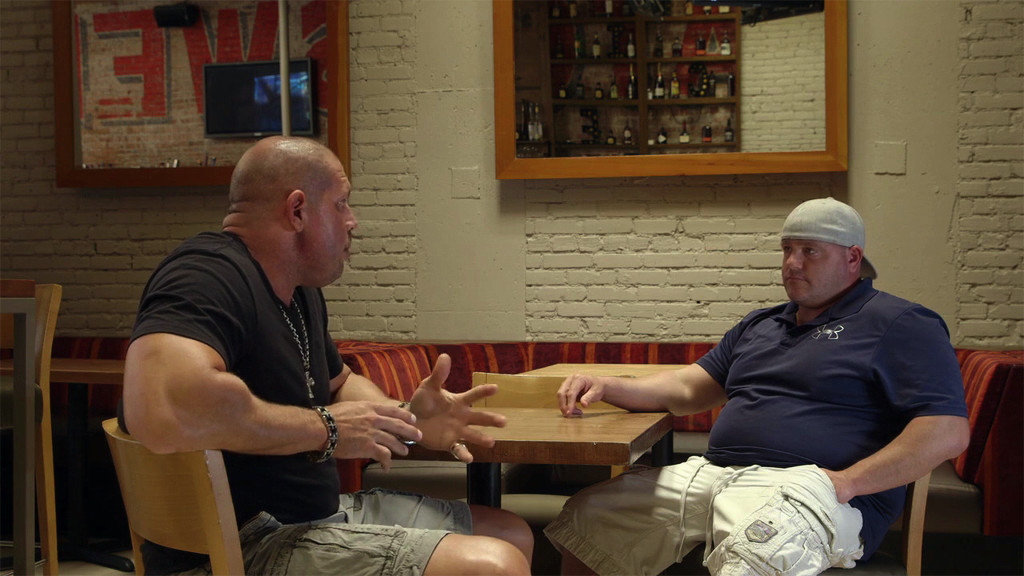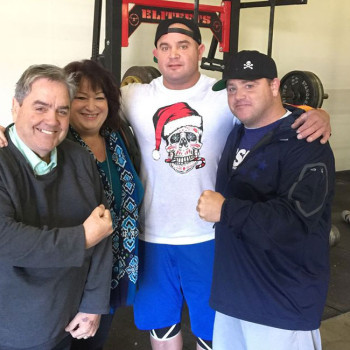This week on Chattering Class, we look into prescription drug abuse and our teacher is documentarian Chris Bell. His first movie, “Bigger, Stronger, Faster*,” examined the use of steroids in America through the lens of his family — his brother Mark was a bodybuilder and his brother Mike was a pro wrestler.
Nine months after the movie premiered, Chris’s father called and told him Mike had died. Not from steroids, but from prescription drugs. That event inspired his new movie “Prescription Thugs,” a look at America’s pill habit, which is formidable. Every 19 minutes someone dies of a prescription drug overdose. When Brendan met with Chris, he asked how people get hooked.

Chris Bell: I think that in my film, I started it in the world of sports because I think a lot of times we think of athletes and we think of the jock, the guy that would be opposed to drugs.
And these are actually the guys that are the junkies nowadays. And I can talk kind of in general. A football player, a pro-wrestler, it’s all kind of the same. They get hurt, when they get hurt, they are prescribed painkillers. Those painkillers — you might have heard of Vicodin or Percocet or Darvocet, Oxycontin — they’re all kind of in the same class of what we call opioid drugs. These are synthetic, basically, versions of heroin, which kill pain.
And so, a lot of guys are getting hooked on these pills. And then when they stop with the painkillers, a lot of times, to get off of the painkillers, they need some sort of benzodiazepine to kill the anxiety that the withdrawals cause from the painkillers.
Brendan Francis Newnam: And what you’re talking about there is something you examine in more detail in the movie, which is: there’s always a pill for something else. There’s a culture of there’s a fix out there for each thing. So if you’re having anxiety from withdrawal, take a pill for that. If you can’t sleep, take a pill for that.
So, it seems like, at one point, pharmaceutical companies shifted from curing people of things like tuberculosis and switched to symptom management.
Chris Bell: Well, if you look at the way that Big Pharma has been run over the years, it used to be run by scientists. They would find diseases and they would find problems in our country, and they would fix them. They would say, “Hey, OK, we have a disease,” like tuberculosis for example, “We’re going to come up with a vaccine for that. We’re going to come up with a vaccine for polio.”
Whereas, you know, most drugs don’t heal anything. They don’t fix anything. They just sort of treat a symptom. A lot of times, nowadays, we have a ton of symptoms that we’ve sort of created, that we’ve made up.
Brendan Francis Newnam: Yeah. And you no longer have scientists, for the most part, leading these companies. You have business executives.
Chris Bell: Well, exactly, that was the shift. In the beginning, they were looking for a way to cure diseases. Now they’re just looking for a way to make money. If you look at– over the past ten years, the top ten pharmaceutical companies made $711 billion, so they made almost a trillion dollars selling drugs. How do you do that? Well, you have to market those drugs.
We’re one of the only countries in the world — us and New Zealand — to actually advertise pharmaceutical drugs on television. The problem that we have with that is that you now have people maybe diagnosing themselves, walking into the doctor’s, and they’re asking the doctor for a pill that they might’ve not even known existed a day ago.
You know, it used to be you go to the doctor and find out what you have and now you go to the doctor and tell him what you have and get that pill for it.
Brendan Francis Newnam: I just want to rattle off a few things I learned in this movie about what’s happened since the Big Pharma boom after the ’80s.
On average, there is something like $420,000 per congressperson spent by pharmaceutical companies for lobbying. At one point, a rehab specialist talks about when the crushable form of Oxycontin — and that means it was easier for people to abuse — when that was taken off the shelves, profits for the company that makes Oxycontin dropped by 80 percent. I mean, what…?
Chris Bell: Yeah, like that fact right there surprised me a lot. I mean, you know, we had a drug like Oxycontin, and when you crushed it, you could either snort it, or you could now mix it with water and inject it, right? And so, that makes it way more powerful. So, what they did is they actually made it so that if you crush it, it’ll turn into a gel, so that you can’t really do anything with it. And when they did that, they lost 80 percent of their profits.
Now, that just sort of proves that 80 percent of the people that were using the drug were using it recreationally. I don’t know. If I’m a person that’s working for Big Pharma, and I’m looking at that, I’ve got to say to myself, “Hey, we’re making a drug that’s seriously being abused.”
Brendan Francis Newnam: Well, the flip side of this, of course, is without consumer demand, right, these drugs wouldn’t be abused.
Chris Bell: Sure.
Brendan Francis Newnam: And so, there’s another layer in this film, which you can speak to. Can you tell the audience about your relationship with the demand for drugs?

Chris Bell: The demand for drugs is always going to be there, and the reason that it is there is because these drugs are highly addictive. For myself, I had a double hip replacement surgery. I was prescribed prescription Percocet, and I got addicted to that Percocet.
I was taking anywhere from 10 to 15 pills a day. Got up to taking 20 to 25 a day and that’s when I said, “It has to stop.”
Brendan Francis Newnam: Well, there’s a mental component to this. Here you are shooting a movie about these drugs that have killed your brother. You’re recording stories of people whose lives have been destroyed, and here you are on drugs while you’re shooting it, keeping it secret from everyone.
Chris Bell: Yeah, sure. It wasn’t something that I wanted to happen. What happened in shooting this movie was basically, I relapsed on a drug called Xanax.
You know, being addicted to pills and trying to finish a movie about being addicted to pills was one of the weirdest situations I’ve ever been in. I mean, the whole time I was doing it, I felt like a hypocrite. I felt terrible trying to do it. And I just knew that I had to come clean.
Brendan Francis Newnam: So, what did you learn about prescription medication addiction, struggling with it, that none of these experts could teach you?
Chris Bell: There is a sad, desperate feeling when you’re addicted. You go into your bathroom, and you look in the medicine cabinet and there’s no more pills left. And then you start looking around on the counter and then you’re digging around on the floor.
And I’m thinking like, “Look, I went to USC film school. I did everything that I needed to do in life. I checked all the right boxes to be successful in life. And here I am on the floor looking for a pill, looking for a drug.”
It’s like, the saddest feeling. And that’s something that no one could ever teach you, and that’s something that no one could ever put in front of you, is the humility that you go through of being an addict. Just the way that you feel about yourself and how bad you feel about yourself. Nobody can teach that.
Brendan Francis Newnam: So, I thought maybe we could end with you explaining something that I learned in the movie, which is the origin of the word “pharmaceutical.”
Chris Bell: Yeah, wow. That was a shocker to me. I mean, I interviewed an author, Greg Critser, in the movie. And what he told me was the origin of the word “pharma” comes from “pharmakon,” and “pharmakon” means to heal and to poison at the same time.
So, when you think of that, and you think of what medicine, the root of what medicine is, it can both heal and kill.It’s a little bit of poison that we’re taking into our body to fix ourselves, and if you think of it that way — hey, look, this is a poison. This is a danger that we’re putting into our body in order, just a little bit of danger in order to fix things. Let’s not put a lot of it in there, you know? Let’s just use a little bit of it for what it’s for.


